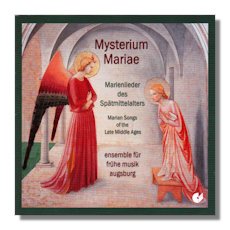
The Internet's Premier Classical Music Source
Related Links
- Wolkenstein Reviews
- Latest Reviews
- More Reviews
-
By Composer
-
Collections
DVD & Blu-ray
Books
Concert Reviews
Articles/Interviews
Software
Audio
Search Amazon
Recommended Links
Site News
 CD Review
CD Review
Mysterium Mariae

Marian Songs Of The Late Middle Ages
- Oswald von Wolkenstein:
- Wer Ist Die Da Durchleuchtet, Kl 75
- Mönch von Salzburg:
- Maidleich Pluem
- Maria Keusche Muter Zart
- Maria Pis Gegrusset
- Anonymous C15th:
- Ave Mater O Maria
- Mutato Modo Geniture
- Ave Gloriosa Mater Salvatoris
- Stella Maris Illustrans Omnia
- Salve Regina
- Imperayritz De La Ciutat Ioyosa
- Polorum Regina
- Ave Pulcherrima Regina
- O Maria Rogatrix
Ensemble Für Frühe Musik Augsburg
Christophorus Entrée CHE0182-2
The Augsburg-based Ensemble Für Frühe Musik has a justifiably high reputation for historically-accurate, expressive, atmospheric and carefully-prepared programs. Here is one such on a recently-reissued CD from Christophorus, which first appeared in 1996. It contains a dozen or so songs dedicated to the Blessed Virgin Mary from anonymous sources and named composers of the late Middle Ages, the fourteenth and fifteenth centuries. Mary was such an evocative subject for musicians and worshippers of that era both because she was seen as an advocate, an interceder, for sinful humankind; and because she was perceived as sinless herself thanks to the immaculate conception of Christ. One striking result, of course, was intense and fervor-filled imagery, in music as much as painting.
If the music is to strike home as it should, a careful course has consequently to be trodden between effect and substance. It's important not to allow our sense of how strong this veneration was to devolve into over-colorful and unduly emotionally-charged performance styles or spuriously exciting or fussy approaches to music that should remain serious and transparent – for all the devotion it represents. The Ensemble Für Frühe Musik achieves just the right balance in these a cappella and beautifully and sensitively-accompanied songs from the likes of Oswald von Wolkenstein (1377-1445), whose Wer Ist Die Da Durchleuchtet [tr.1] sets the tone well… calm, focused, sinuous; and Mönch von Salzburg, who was also working around the year 1400.
The latter's Maria Keusche Muter Zart [tr.5] is a perfect example of the blend between distinct and penetrating articulation and exultation just alluded to. Every syllable is clearly audible on this CD. But so is the ardor in the singer's voice. The minimal, yet effective, harp accompaniment does more than provide a vague setting. It embellishes the direction and import of the text, fully justifying its necessarily speculative inclusion. In fact the Ensemble consists of only four musicians, all of whom play at least one instrument as well as sing.
These two named composers, von Wolkenstein and Mönch, were (among) the first to write polyphonic Lieder, rather than imitations of earlier (French) and simpler styles. The other nine pieces on the CD are anonymous – English, German, Italian and Spanish. This is a varied selection and sequenced in such a way that freshness abounds – in subject, instrumental and vocal color, length of piece (ranging from just under 2½ to over ten minutes) and even of tempo; although it has to be said that the majority of these works is stately, reflective and has an aura of respect. Though never mundane or ritualized.
Several of the anonymous settings have much earlier origins – the Salve Regina [tr.8] from the 12th Century, for example. In all cases, though the Ensemble's approach, sparing addition of instruments, and delicate yet sure singing, serve to project the same dedication to the confessional world of the subject as presumably those who performed, refined and perfected the music (for, Yes, this music does have the tinge of perfection in melody and harmony about it) in the late Middle Ages. At the same time the compact, measured and immediately personal Maria Pis Gegrusset [tr.9] speaks as directly and unflinchingly as any Schubert Lied.
On the other hand, the CD has the feel much more of a carefully researched anthology with a purpose – to present the variety and context of this then adventurously rich art form – than a sampler or random mix for its own sake. This is – again – due in no small part to the dedication and enunciation of the singers/players. One senses that they were engaged in a well-conceived, cleanly- and imaginatively-executed exercise in exploring the repertoire as much in celebration as mere exposure. Yet without ever relying on the very specific sound world (a beautifully sonorous and liquid recorder, two gothic harps, psaltery and fiddles as well as voices) to convey the beauty and depth of the music.
The acoustic is very resonant, but not so much as to suggest all evocation yet nothing worth evoking. Audibility is still paramount. The booklet has texts in Latin or the original Middle German, with modern German. It contains little about the Ensemble. But brief details of the songs themselves, when they were sung, first appeared, their provenance and manuscript locations etc. If this is a period or repertoire which intrigues you, you should have no hesitation; if it's new to you and you want to discover some of its depths, this is accomplished music making of great loveliness and character which has a wider appeal than the CD's description might suggest thanks to the music's timelessness and insight. Thoroughly recommended.
Copyright © 2013, Mark Sealey





















